
|
You entered: Norway
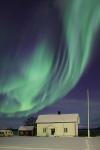 Green and Black Auroras Over Norway
Green and Black Auroras Over Norway
29.03.2006
What causes gaps between aurora curtains? These unusual gaps can make Research using data from four Cluster spacecraft orbiting the Earth has likely found the secret: auroral gaps, sometimes knows as black auroras, are actually anti-auroras. In normal auroras, electrons and/or predominantly negatively charged particles fall toward Earth along surfaces of constant magnetic field.
 Northern Lights above Lofoten
Northern Lights above Lofoten
16.06.2016
The Aurora Borealis or northern lights are familiar visitors to night skies above the village of Reine in the Lofoten Islands, Norway, planet Earth. In this scene, captured from a mountaintop camp site, the auroral curtains do seem to create an eerie tension with the coastal lights though.
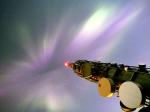 Aurora Over a Communications Tower
Aurora Over a Communications Tower
28.09.2004
Higher than highest communications tower, higher than highest mountain, higher than highest airplane, lies the realm of the aurora. Auroras rarely reach below 60 kilometers, and can range up to 1000 kilometers. Aurora light results from energetic electrons and protons striking molecules in the Earth's atmosphere.
 Northern Equinox Eclipse
Northern Equinox Eclipse
20.03.2015
Snowy and cold is weather you might expect at the start of spring for Longyearbyen on the Arctic archipelago of Svalbard, Norway. But that turned out to be good weather for watching the Moon's umbral shadow race across northern planet Earth.
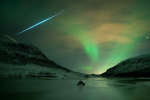 Aurora Shimmer, Meteor Flash
Aurora Shimmer, Meteor Flash
19.12.2009
Northern Lights, or aurora borealis, haunted skies over the island of Kvaløya, near Tromsø Norway on December 13. This 30 second long exposure records their shimmering glow gently lighting the wintery coastal scene.
 Iridescent clouds
Iridescent clouds
11.03.2003
Why would clouds appear to be different colors? A relatively rare phenomenon known as iridescent clouds can show unusual colors vividly or a whole spectrum of colors simultaneously. These clouds are formed of small water droplets of nearly uniform size.
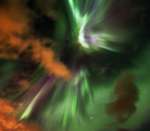 Cloudy Night of the Northern Lights
Cloudy Night of the Northern Lights
30.09.2011
On September 26, a large solar coronal mass ejection smacked into planet Earth's magnetosphere producing a severe geomagnetic storm and wide spread auroras. Captured here near local midnight from Kvaløya island outside Tromsø in northern Norway, the intense auroral glow was framed by parting rain clouds.
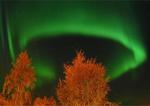 Aurora s Ring
Aurora s Ring
15.10.2002
Gusting solar winds and blasts of charged particles from the Sun made the early days of October rewarding ones for those anticipating aurora. While out enjoying the stormy space weather from Toemmeraas, Norway, Trygve Lindersen recorded this picturesque apparition of the northern lights with a digital camera on October 6.
 Earth, Clouds, Sky, Comet
Earth, Clouds, Sky, Comet
3.04.1997
Does a comet's dust tail always orbit behind it? Since comets rotate, they shed gas and dust in all directions equally. Small ice and dust particles expelled by the comet, however, are literally pushed around by sunlight. The smaller the particle, the greater the effect.
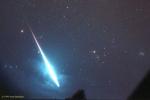 1999 Leonid Fireball
1999 Leonid Fireball
2.12.1999
Most Leonid meteoroids, the bits of comet debris which produce the annual Leonid meteor shower, range from a mere millimeter to a centimeter in diameter. Yet these cosmic grains of sand and gravel can put on quite a spectacular show. How can something so small generate so much light?
|
January February |
|||||||||||||||||||||||||||||||||||||||||||||||||